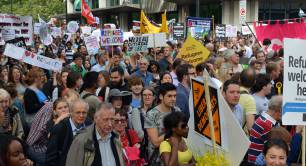Refugees find a home in Berlin
How do we accommodate refugees into our society? One organisation is not only offering accommodation but promoting understanding between residents and newcomers.
Whether it’s Britain trying to sweet talk the EU into a separation that will involve trade but not more migration or Donald Trump saying he’s going to build a wall on the border with Mexico, it’s clear that the movement of people across borders is a major political issue at the moment. And politicians wouldn’t be talking about it so much if it wasn’t also a concern for voters.
While the politicians try to arrange deals for quotas or score points for leadership on the issue, some people are just trying to find solutions to the problems in the most humane way possible.
When Pioneers Post was invited to Berlin recently to witness the coming together of social innovators with lots of ideas about ‘Integrated Futures’, the theme of this year’s European Social Innovation Competition, we were taken to meet Fatuma Musa (pictured above), now resident in the city’s Sharehaus Refugio.
Even if you don’t speak German, the name of the Sharehaus gives you an idea what goes on there. It’s a place that is intended to provide refuge for people who have lost their homes or were forced to flee to seek a new life.
A vast five story building that used to be home to elderly people in the Kreuzberg area of Berlin, some of it is funded by the artists that pay to have studios there. The café on the ground floor and the bar on the roof garden also brings in some income.
But there are also 40 residents that have been paying a lower rent than average for this part of Berlin. 26 year old Fatuma Musa from Somalia was the first. “What we stand for is sharing, being one, being united, being a family, being a community,” she explains.
Founders Sven Lager and Elke Naters had run a similar project in South Africa before coming to Berlin. The building belongs to the Berliner Stadtmission, a Christian association for a broad range of people in need. After running a smaller version of the refugio locally, Lager and Naters were asked if they could do something with the bigger building, including refugees this time.
On a tour of 'refugee Berlin' the day before, Syrian guides from social enterprise Querstadtein had let us know that many refugee centres are located on the outskirts of Berlin. This makes it difficult for newcomers to even meet, let alone integrate with locals.
The guides had pointed out a disused branch of C&A in the city centre where some luckier refugees currently live. Far from luxurious and without adequate sanitation facilities, it is still considered to be a superior place to stay, its location enabling inhabitants to get into the city to attend meetings with the authorities, open bank accounts or top up their mobile phone to call home, without having to pay for transport.
Germany has been the most welcoming European country to migrants. The country took in 1.1million migrants in 2015 and the Federal Office for Migration and Refugees expects to process the same amount of asylum applications this year.
Can you imagine a mother with three kids coming across the Arabian Sea, being detained in jail, being raped...?
The Sharehaus is home to people from many countries, among them Syria, Somalia and Afghanistan. Fatuma’s own mother fled Somalia with her three children: “Can you imagine a mother with three kids coming across the Arabian Sea, being detained in jail, being raped, her family being tortured to send money whilst listening to her being beaten on the phone. Can you imagine having to go through that?”
Eventually her mother got to Kenya. Musa later spent two years working in the Dadaab refugee camp there, home to more than 300,000 refugees, making it the largest such camp in the world.
She receives no benefits in Berlin and tells me she is a freelancer. On her website she describes herself as a freelance consultant focusing on integration of newcomers (the word she prefers to ‘refugee’), community building and women and human rights. Musa has a degree in development studies from Mount Kenya University in Nairobi.
Some of the rooms at the Sharehaus are available for free; some of them have to be paid for. This is partly because only some of the people who come in have work permits. People already working and living at the Sharehaus then have to get to know the applicant and decide if they will fit.
In the end, four people decide if an applicant can come in – Andy the chef at the café, Jeanette and Denise who manage the house and, Sven the founder. Residents get 18 months and are then expected to give up their room for someone in the same position as they were when they arrived.
There are nice people who are welcoming and there are those that don’t want us
There is some priority given to gender, the mix of cultures is also considered and the vulnerability of that person comes into play. Residents are encouraged to share learning, for example, giving Swahili lessons in exchange for German lessons. Understanding is also key – residents are also encouraged to share aspects of their culture, something that often happens when they share food in the common kitchens.
So is the project working – what has Fatuma’s experience of Berlin been like? “There are nice people who are welcoming and there are those that don’t want us,” she replies. The Sharehaus is, she thinks a way of trying to understand each other: “We try to support each other through the process of change. We need to learn about German society and German society needs to get to know us and for this to happen we needed a space to come together.”



